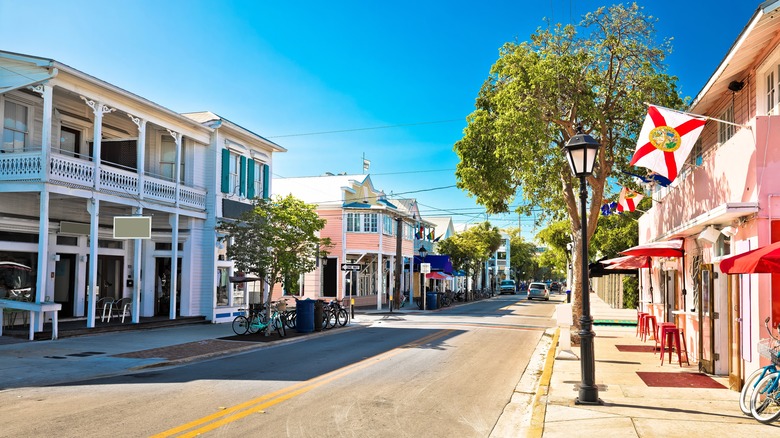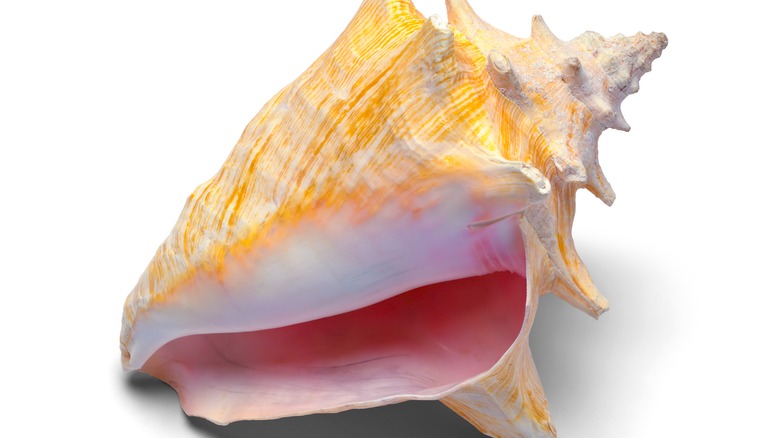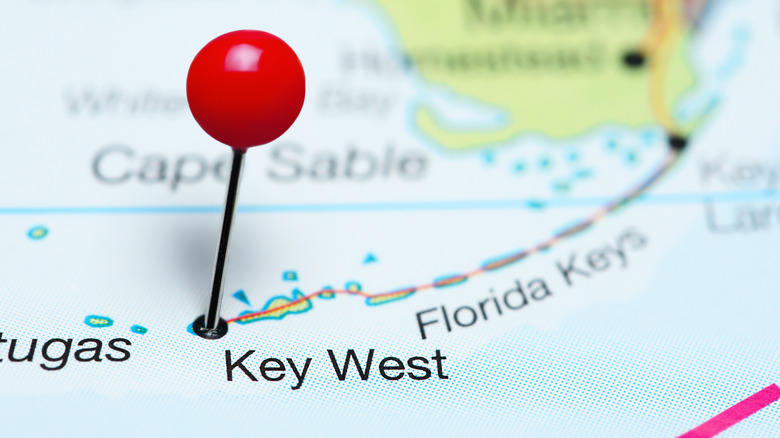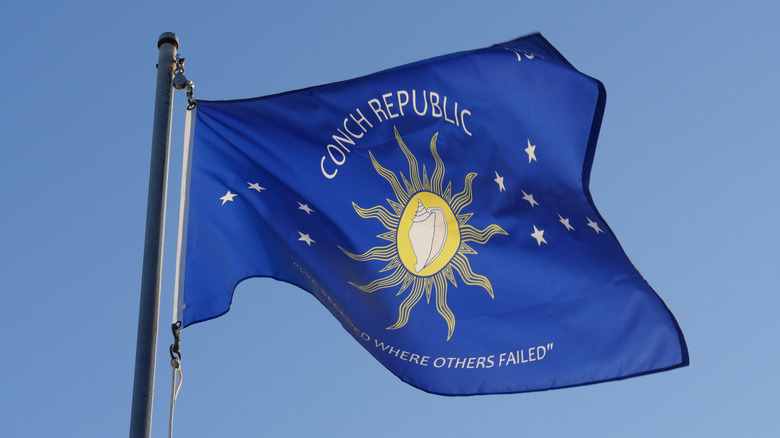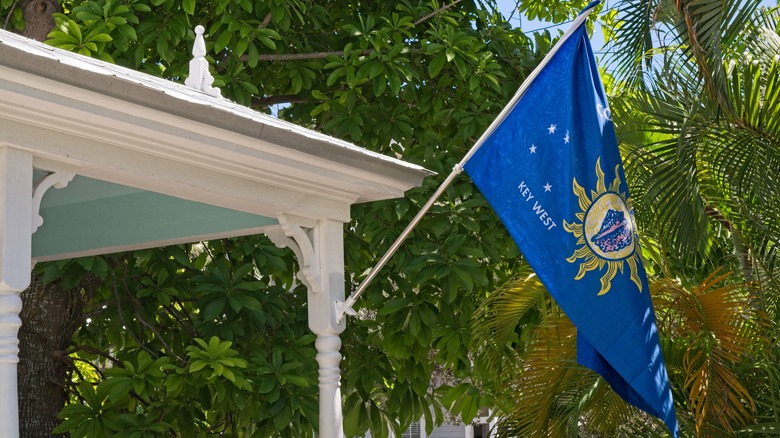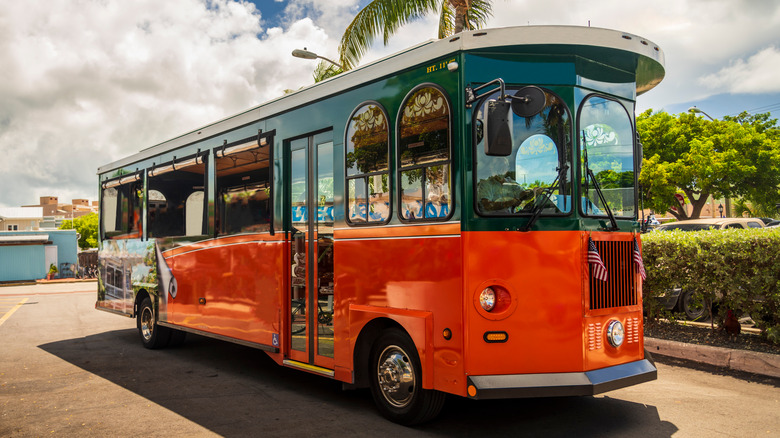The Conch Republic: When Key West 'Seceded' From Florida And Became Its Own Country
Key West, Florida (pictured above) is one of those American cities that — like Roswell, New Mexico, or Eureka Springs, Arkansas — leans into its weirdness. Around town, the vibe is one of lazy days, enjoying the tropical beaches, cold beers, and a few eccentric locals thrown in for some color and flavor. It's as if a Jimmy Buffett song became a town.
Of course, the town's 27,000 or so residents (via the U.S. Census Bureau) are regular people who have jobs, families, and lives, as opposed to being living tourist attractions for the cruise ships. And so when their lives were disrupted back in the Reagan administration thanks to some overzealous immigration enforcement, the inconvenienced Conchs, as they like to be called, reacted in the most Key West way possible. Since they were up against the federal government, all they could do was make a point. But they made the point in style, and it's a source of pride around the island 40 years later: They declared their own micronation, the Conch Republic.
Conchs and Micronations
Before delving too deeply into the story of the micronation known as the Conch Republic, it helps to define some terms. And the two most important terms for this particular discussion are "conch" and "micronation." According to Conch Tour Train, a conch (pronounced "konk" — the "-ch" at the end is a hard "k") is a marine snail that lives in a giant shell, also called "conchs" or "conch shells." You may have seen someone put one of the shells to their lips and blow into it, creating a loud sound not unlike a siren. They're all over the place in the Gulf of Mexico and around Key West, and restaurants in town serve them (if eating rubbery arthropods is your thing). The locals call themselves conchs, because of course they do.
A micronation is an unofficial country lacking any sort of international recognition or status, according to BBC News. Some — like the Republica of Molossia — are jokes, some are sort of real. And some, like the Conch Republic, exist at the hazy intersection between joke and reality.
Key West And The Reagan Administration Border Patrol
Back in 1982, the United States Border Patrol decided to create a checkpoint near the Florida Keys (via the Conch Republic's website). Ostensibly, the goal was to search vehicles for drugs and/or illegal immigrants. However, there are several problems with this, not the least of which is that for the locals, this meant a 17-mile traffic jam, to say nothing of the disruptions to their lives. It also disrupted the town's economy, as would-be visitors started canceling their hotel reservations.
The town's leadership went the more usual route in trying to get relief: through the courts. However, a federal court sided with the Border Patrol in this case and refused to issue an injunction that would stop the checkpoint. So the town decided that if the United States was going to treat the island as if it were a country — its people treated as foreigners subject to searches as they moved between the two places — then Key West would become its own country.
The Conch Republic Is Born
On April 23, 1982, the Conch Republic was born (via CME Travel). Having been stymied in court in their efforts to get the Border Patrol to stop treating Key West's citizens as foreign smugglers, then-Mayor Dennis Wardlow told reporters that he and his team were going to "go home and secede" (per the Conch Republic website). Key West was now its own nation, the Conch Republic, and Wardlow was prime minister. The locals then went to "war" with the United States — by throwing water balloons at a nearby Coast Guard vessel, which itself "fought back" with its fire hoses. The mayor also broke a loaf of stale Cuban bread over the head of a Navy seaman (or perhaps someone dressed as one).
According to Conch Tour Train, the new nation ultimately "surrendered" to the U.S., specifically to a Navy admiral who happened to be in town that day. Wardlow then demanded 1 billion dollars from the U.S. in foreign aid (per CME Travel).
It Worked
The declaration of the Conch Republic as an independent nation was a success — on multiple levels. Ironically, the only level on which it didn't work was on its recognition as a real nation: that never happened, and no one expected it to happen. However, it did succeed in getting the Border Patrol to dismantle its checkpoint, although that may have had less to do with the protest and more to do with the national publicity the whole thing was getting (per the Conch Republic website). The website does note, however, that the city is still waiting on its 1 billion dollars in foreign aid.
It actually worked even better than hoped: The news coverage of the event drew interest to the city, and tourism, once bedeviled by the Border Patrol's interference, got even bigger in the town than it was before Key West's "secession." And of course, there's local pride, which can't be measured in dollars and cents. It's been 40 years, and doubtless, many of the people involved in the protest have passed on, but even today, the Conch Republic lives on in Key West.
The Conch Republic Lives On
The Conch Republic, though it only "existed" for a few minutes (and here the word "existed" is being used extremely liberally), remains a source of pride for the Key West locals. These days, the short-lived "republic" is largely wrapped up in the generalized quirkiness that is Key West. "Today we stand proudly as a community of who have 'Sovereign State Of Mind' and as the 'People who seceded where others have failed," (seceded instead of succeeded, get it?), notes the Conch Republic website. And of course, where there's lore, there's merchandise. Flags, T-shirts, coffee mugs, and all manner of Conch Republic bric-a-brac are sold around town and online. You can also purchase Conch Republic passports, although prudence compels us to warn you that trying to get through an international border with what is effectively a keepsake is ill-advised at best.
"The Conch Republic exists as a sovereign state of mind, which signifies our vision of the America which we are proud to be part of," notes its website.
